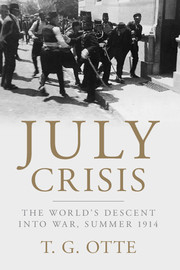Book contents
- Frontmatter
- Dedication
- Contents
- List of illustrations
- List of maps
- Preface and Acknowledgements
- List of abbreviations
- List of the principal dramatis personae
- Europe, 1914
- The Balkans, 1914
- Introduction
- 1 Prelude: the road to Sarajevo
- 2 Sarajevo and its echoes: 28 June to 5 July
- 3 The triumph of tactics over strategy: 6 to 21 July
- 4 Localizing the crisis: 19 to 23 July
- 5 The ultimatum: 23 to 26 July
- 6 Localizing the war: 26 to 28 July
- 7 Escalation: 29 July to 4 August
- Conclusion
- Index
- Plate section
- References
7 - Escalation: 29 July to 4 August
Published online by Cambridge University Press: 05 July 2014
- Frontmatter
- Dedication
- Contents
- List of illustrations
- List of maps
- Preface and Acknowledgements
- List of abbreviations
- List of the principal dramatis personae
- Europe, 1914
- The Balkans, 1914
- Introduction
- 1 Prelude: the road to Sarajevo
- 2 Sarajevo and its echoes: 28 June to 5 July
- 3 The triumph of tactics over strategy: 6 to 21 July
- 4 Localizing the crisis: 19 to 23 July
- 5 The ultimatum: 23 to 26 July
- 6 Localizing the war: 26 to 28 July
- 7 Escalation: 29 July to 4 August
- Conclusion
- Index
- Plate section
- References
Summary
One afternoon I watched him as he stood
In the twilight of his wood.
Among the firs he’d planted, forty years away,
Tall, and quite still, and almost blind,
World patience in his face, stood Edward Grey;
Not listening,
For it was at the end of summer, when no birds sing:
Only the bough’s faint dirge accompanied his mind
Absorbed in some Wordsworthian slow self-communing.
SIEGFRIED SASSOONIn the course of 29 July, the other Powers received final confirmation of Austria-Hungary’s declaration of war on Serbia. With considerable delay Vienna thus confronted the chancelleries of Europe with the fait accompli that Berchtold had hoped to create in the immediate aftermath of the Sarajevo assassination and that the Wilhelmstrasse had urged upon the Monarchy since 5/6 July. The crisis now reached its decisive phase. Localization and a Habsburg triumph over Serbia, the objective of German diplomacy, could be achieved now only if the other Powers were prepared to bow to Berlin’s pressure and Austria-Hungary’s intransigence. To avert further escalation, on the other hand, required of the German leadership a softening of its support for Vienna, or for the latter to suspend military operations to allow for a last-minute diplomatic settlement. How serious the situation had become, and how close to the brink of war Europe had moved, was underlined when, in the afternoon of the previous day, the Netherlands became the first country not directly involved in the Balkan squabble to mobilize its armed forces.
As during the previous days and weeks, much depended on Vienna’s next moves, but even more important were the decisions taken at St Petersburg and Berlin. For the Ballhausplatz, two pressing issues had to be tackled. For weeks Germany had urged Vienna to commence the military campaign against Serbia at the earliest possible moment in order to create facts on the ground. For weeks Vienna had tarried. Now it was ready to strike; and now Berlin sprang its ‘Halt in Belgrade’ surprise on the Ballhausplatz. Both were interlinked; both were compatible with each other, but either had the potential to sabotage the other.
- Type
- Chapter
- Information
- July CrisisThe World's Descent into War, Summer 1914, pp. 370 - 504Publisher: Cambridge University PressPrint publication year: 2014

